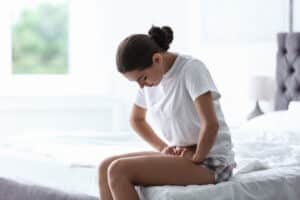
Symptoms of Endometriosis
This condition has several symptoms, but persistent pelvic pain is the main indicator. Those with endometriosis often complain of excessive cramping during their menstrual cycle. Additional symptoms include:
- Lower back pain
- Lower stomach area pain
- Pain during or after sex
- Excessive bleeding during periods
- Bleeding between periods
- Pain when urinating
- Pain when defecating
- Fatigue
- Constipation or diarrhea
- Bloating
- Nausea
It is important to note that the pain may not always be relevant to the severity of the condition. It is possible to have small growths that trigger more noticeable pain than large growths in many places.
Risk Factors and Causes of Endometriosis
Doctors have not yet confirmed what causes endometriosis, but many believe a variety of factors contribute to this condition, including:
- Menstrual blood flowing into the pelvic cavity through the fallopian tubes
- Peritoneal cells transforming into cells similar to those in your uterus
- Hormones causing cells in the early stages of development to transform into endometrial-like cell growths
- Surgical scars
- Immune system issues
Endometriosis may also be genetic and common among women with a low body mass index.
Risk factors for endometriosis include never having been pregnant and starting your period at an early age. Additionally, some women have menstrual cycles that are less than 27 days–doctors believe that this may also be a risk of developing endometriosis, as are heavy periods that last longer than seven days.
Where to Find Diagnosis and Treatment for Endometriosis in Houston, TX
Northwest Women’s Center is a leading obstetrics and gynecology practice in Houston, TX. Whether you’re seeking routine check-ups, specialized treatments, or personalized care, we are here to support you on your healthcare journey.
Speak with one of our doctors today to find out more information about endometriosis and how to begin treatment. To arrange for an appointment, please call 281-444-3440.